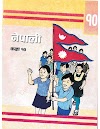Class 12 English Guide
3. The Bull ( By:- Bhimnidhi Tiwari) VVI
Summary
The
Bull" is a one-act play that has been written by a famous Nepali poet and
dramatist Bhimnidhi Tiwari. The play has satirized the feudal system of the
society (18th century). The story of the play has presented the death of King
Rana Bahadur Shah's bull called Male and the panic situation of three major
characters as the bull doctor and two cowherds called Jitman and Gore.
The play
has taken place in the month of Ashwin in 1854 B.S. At the beginning of the
play, we find two panic-stricken cowherds Gore and Jitman coming to the house
of Laxminarayan. They have come there to inform about the death of the bull of
king Ranabahadur Shah. After hearing their story, Laxminarayan starts
shivering. All of them become quite worried about the possible punishment from
the king. The king can even give them the death penalty. Laxminarayan is afraid
of being shaved as punishment. Once Laxminarayan's mouth was burnt as a
punishment for speaking with a loud voice in front of the king. Both
cowherds state that the bull died because it didn't get enough food (grass) and
couldn't digest fine rice and soup of split gram. Laxminarayan tells the
cowherds not to tell the king that the bull has died. If they inform the king
about bull's death, they will have a terrible fate.
After advising
both cowherds, Laxminarayan moves toward the Basantpur palace to inform the
king about the ill health of the bull. Laxminarayan bows down in front of the
king with reverence and informs him that the bull is ill. He doesn't directly
tell that the king that the bull has died. He relates to the king about
the condition of the ill bull. According to him, the bull sir doesn't wake up
and eat breakfast. He doesn't speak or move. He only stares with still eyes.
Laxminarayan starts praising the beauty, walking style and brave fight of the
bull. He proposes the bull be taken to the hill for climate change and to heal
the health of the bull.
After
hearing Laxminarayan's words, the king decides to check the bull's condition
himself and moves to the cowshed located at Thulo Gaucharan with his security
persons.On the other hand, both cowherds Jitman and Gore are waiting sadly at
the cowshed to hear the decision of the king. They even think of escaping to
save their life but they think they will be arrested again and killed. The king
approaches there. Laxminarayan runs ahead of the convoy at Thulo Gaucharan to
tell the cowherds to massage the back feet of the bull and wave the fan at the
bull. They do accordingly. Laxminarayan even informs the king that they had been
caring for the bull since midnight.
The bull is actually
lying dead on the mattress. There is no movement. It is neither breathing nor
eating anything. Its tail has loosened and ears have drooped down. Yet, the
cowherds and Laxminarayan cannot declare its death due to fear. King
Ranabahadur Shah himself says the bull is dead. After listening to the king,
Jitman starts crying and says he has been an orphan after the bull's death. The
King declares a tip of 400 rupees and tells him to be quiet.
Gore also
starts crying. He says that he loves the bull more than his mother, father,
wife and children. He says he will go with the bull or hang himself. Hearing
his words, the king declares the tip of 500 rupees. At last, Laxminarayan
himself starts weeping and pretends to be in sad. The king scolds him and
orders him to burry the bull and manage the funeral rites and give offerings to
the priest himself. At last, Gore and Jitman express their happiness to be
alive.
This play
"The Bull" clearly describes the feudal system of the society where
ordinary human beings were suppressed, dominated and dehumanized. Animals of
the feudal lords deserved more respect than those ordinary people. It deals
with the themes of dehumanization of ordinary people by the feudal lords, the
domination of women.
Answer the following
questions.
a. Why have Gore and
Jitman come to see Laxminarayan?
Answer:Both cowherds Gore
and Jitman come to see Laxminarayan to inform him about the death of the bull
(Male) of king Ranabahadur Shah.
b. What, according to
cowherds, is the reason behind the death of Male?
Answer:According to
cowherds, the reason behind the death of Male is getting less food (grass) and
being unable to digest fine rice and soup of split gram.
c. Why does Ranabahadur
want to see the bull himself?
Answer:Ranabahadur wants
to see the bull himself because he wants to check the bull's condition and
doesn't want the bull to be taken to the hill if it gets cured/treated at Thulo
Gauchar, Kathmandu.
d. Why does Laxminarayan
run ahead of the convoy at Thulo Gaucharan?
Answer:At Thulo
Gaucharan, Laxminarayan runs ahead of the convoy because he wants to convey a
message to the cowherds to massage the hind feet of the bull and wave the fan
at the bull to please the king, Ranabahadur Shah. Otherwise, the king would be
angry and punish them. He wants to show their care towards the bull to the
king.
e. Why do Gore and Jitman
cry when the king declares that Male is dead?
Answer:When the king
declares that the Male is dead, Gore and Jitman cry to show their so-called
care and attraction towards the bull. Both start crying in a very pretentious
way to have mercy of the king upon them. They want themselves to be saved from
the punishment of the king. Otherwise, the king might punish them and blame
them for the death of the bull.
f. How do we learn that
the full is dead?
Answer:We learn that the
bull is dead by the statements of cowherds and the king. Both cowherds say that
the bull's tail has loosened and eyes are still and the king also says
"The bull does not breathe, his tail has loosened, ears have drooped down,
and doesn't eat anything either."
g. How does the play make
a satire on the feudal system?
Answer:This play
has presented the feudal system and its bad deeds against ordinary people.
Here, we find suppression, domination and dehumanization of the feudal system.
The cowherds have been presented so panic who live by the mercy and grace of
their lord. These people have fearful lives where the lord's animal is given
more facility, respect and care than them. Both of them hide the fact of the
dead bull and pretend in front of the king to save their lives. The play makes
a satire on the feudal system by presenting dehumanization and suppression of
the feudal lord against their workers.
h.Discuss the late
eighteenth-century Nepali society as portrayed in terms of the relation between
the king and his subjects as portrayed in the play.
Answer:During the
late eighteenth century, the monarchy system was prevalent in Nepal. At that
time, Nepal was ruled by Shah Dynasty. The then society was quite rigid. People
didn't have freedom in their lives. People had to live under the domination of
the king and his people.
The play
"The Bull" has presented a very harsh society where people had to
live very fearful life under the king/ lords. The condition of ordinary people
wasn't so good. They were badly treated by their lords. They got severe
punishment if they acted against their lords. We can get a fine example of
people's miserable conditions in this play. If people didn't do swosthi (bowing
down to the lords with respect) to the lords/kings, they were punished for
their disrespect. There were no fundamental rights provided to the people. The
awareness of politics among the people was very low. The patriarchal norms and
values were there in most societies. Women had to spend their lives under male
domination. Males were allowed to marry many women. In the play, we find Laxminarayan
with seven wives. He even seems to add one more wife. The life of ordinary
people or subjects was under the mercy of the kings or lords.
i. What does the
relation between Laxminarayan and his wives tell us about the society of
that time? To what extent has the Nepali society changed since then?
Answer:Laxminarayan is a
forty years old man who is a bichari(legal officer) and bull doctor of
king Ranabahadur Shah. He has married seven women in his lifetime. He doesn't
seem satisfied even after having seven wives at home. He is still planning to
marry another woman. At home, he calls his seven wives using derogatory names
such as flat-nosed, beautiful, butterfly, swallow, ugly face, etc. He has
provided his wives with different nicknames which shows the patriarchal
domination as well as women's condition of the then society. During that time,
marrying many women was so common. Society was quite rigid where males were
considered as superior beings and females as inferior beings. The married women
had to spend their lives under the men's domination and control. They had to be
dependent and spend their most of time within the boundaries of the houses. The
main cause behind all those aspects was illiteracy, child marriage, poverty,
Feudalism and lack of awareness etc among the people.
In the
context of Nepal, Nepali society has been changed a lot since then. In
the present time, the condition of Nepali women is far better than as it is
expected. With time, Nepali women have got a variety of rights according to the
constitution of Nepal. In today's society, the awareness, as well as literacy
among Nepali women, has significantly increased. They are no more dependent on
their husbands. They are even on the way of earning similar as males. There is
no domination of males in society. The Constitution of Nepal has provided equal
opportunities to both males and females of Nepal. In Nepal, most females have
been seen in the highest ranks in different sectors. There is the provision of
harsh punishment in the constitution of Nepal for those who treat females
badly. Many institutions in Nepal are working for the welfare of Nepalese
women, their rights and empowerment.
j. Shed light on the
practice of chakari as portrayed in the play. Have you noticed this
practice in your society?
Answer: During the reign
of the kings in Nepal, the concept of chakari was so common. During the
monarchy system, most of the people were in this business of doing chakari of
their kings, leaders as well as lords. Chakari was a kind of ritual by the help
of which people expected to get profit and promotion in their lives. People had
to do chakari of their kings and lords to be good in front of them all the
time. If they failed to do proper chakari, they would get unexpected harsh
punishments.
In this
one-act play "The Bull", we find the concept of chakari a
lot. Here, we find the major characters in the play as Laxminarayn Dahal
and two cowherds Gore and Jitman doing the chakari of the king Ranabahadur Shah
a lot. They seem too fearful about the king. The fear of the king's punishment
makes them so flattery.
Laxminarayan
is a character who knows very well about the concept of chakari. He has even
experienced the punishment of the king due to his bad deed of talking in a loud
voice in front of the king. When the bull dies, both cowherds inform
Laxminarayan about it. All of them become much fearful about the king. Both
cowherds even sleep on the cowshed along with the dead bull. They pretend to be
much careful about the bull. To please the king, they start massaging the
bull's feet and waving a fan at him. They even address the bull as "The
Bull Sir" in front of the king. When the king himself declares the bull's
death, both cowherds start sobbing much with sentiments. Thus, the play is full
of chakari.
Yes, I
have seen this practice in my society a lot. Everyone is doing chakari of
others. The concept of selfishness is at its height. People in the present time
are too concerned about their well being. Money, fine ranks, prosperity etc
have become parts of their lives. Thus, chakari is still prevalent in the
societies of Nepal. But the way of doing chakari is quite different than that
of the then society. Nowadays, people are seen doing chakari of politicians a
lot in Nepal.
k. How does Laxminarayan
outsmart Ranabahadur?
Answer: Laxminarayan
outsmarts Ranabahadur with his tactful acts. He is a forty years old legal
officer as well as a doctor of the bull of king. As soon as he hears about the
king's bull death news by Gore and Jitman, he moves to the king's palace. He is
quite good at the flattery of the king. He doesn't directly tell about the
death of the bull to the king because the king might get angry about the news.
Instead of telling the fact to the king, he tells the king about the bull's
illness. While moving towards the cowshed, he even orders the cowherds to
massage and wave a fan at the bull to impress the king and save their life. The
king supposes that the bull died despite proper care and treatment just in
front of him. Due to Laxminarayan's tactics, the king doesn't doubt them and
they escape the harsh punishment of the king.
l. Sketch the character of Laxminarayan.
Answer: Laxminarayan
Dahal is one of the major characters of this one-act play. He is a
forty-year-old legal officer as well as a bull doctor of king Ranabadur Shah.
He has married seven women. There are his altogether seven wives at home but he
seems quite dissatisfied with them. He is intending to marry the eighth woman.
When he hears about the death of the king's bull, he makes proper use of his
mind and acts very smartly to save himself and the cowherds' lives from the
king's punishment. He moves to the king's palace but doesn't directly tell the
news of the bull's death to the king. He knows very well about the flattery
(chakari) of the king. When the king himself moves to the cowshed at Thulo
Gauchar to see the bull, he acts quite cleverly and orders the cowherds Gore
and Jitman to massage and wave fan at the dead bull to please the king.
Laxminarayan
and his clever acts have made this play so humorous. Due to his tactfulness,
they have been saved from the king's harsh punishment. Thus, we can say that
Laxminarayan is the main person who has outsmarted the king with his tactful
acts as well as flattery.





.png)



.gif)



0 Comments